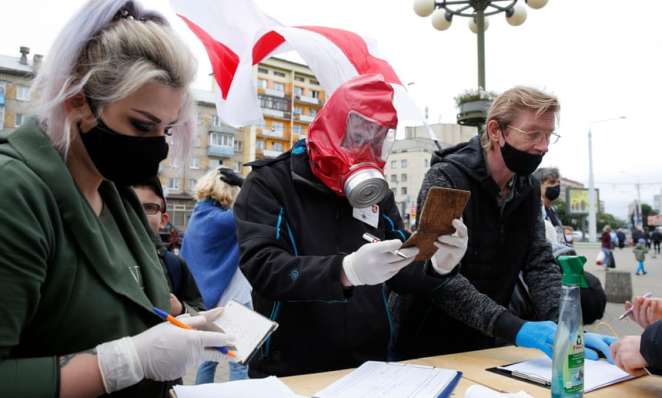Belarus blues: can Europe's 'last dictator' survive rising discontent?
Andrew Roth, The Guardian
16 June 2020, 22:27
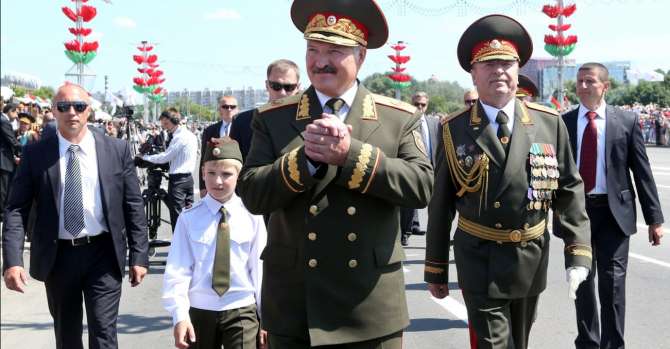 After decades in power, a bungled Covid-19 response has triggered a genuine electoral challenge
After decades in power, a bungled Covid-19 response has triggered a genuine electoral challenge
Viktor Babariko, an outspoken ex-banker, embodies elite discontent with Belarus’s Alexander Lukashenko and his 26 years at the head of Europe’s most authoritarian state.
After decades out of politics, Babariko says he decided to mount a challenge and run for president this year both to oppose economic integration with Russia and because of the “totally irresponsible” handling of the coronavirus pandemic. Lukashenko refused to impose a lockdown, claimed that drinking vodka would keep the virus at bay and went ahead with a 9 May Victory Day parade involving thousands of soldiers and elderly war veterans.
The country currently has 54,500 confirmed cases of Covid-19 – significantly more than the 29,700 in neighbouring Poland, which has four times its population.
“The government has lost touch with reality. The response to Covid-19 was absolute evidence of that,” Babariko said in an interview. “They think that the Belarus that has lived so quietly and meekly for the last 26 years will continue. But the country that they think still exists is gone.”
![Belarus blues: can Europe's 'last dictator' survive rising discontent?]()
Lukashenko, sometimes described as “Europe’s last dictator”, has been president since 1994, winning re-election in curated campaigns that delivered 80% majorities. But on the verge of his sixth term as leader, he is in danger of facing a real election. Grassroots campaigns have collected hundreds of thousands of signatures to attempt to register three genuine opposition candidates.
In response, the government has launched a crackdown. One candidate has already been charged with public disorder and Babariko’s former bank was raided last week. Opponents say Lukashenko’s public approval has collapsed. “I can nearly guarantee you that Lukashenko has less than 50%,” Babariko said. “That’s what makes these elections unique.”
![]()
There are numerous factors for the discontent: a faltering economy, the bungled response to coronavirus, the growing reach of criticism through social media, an increasingly confident civil society – and exhaustion with a government that seems to have run out of ideas.
“It became an explosive cocktail,” said Valeriya Kostyugova, the editor of the Minsk-based Nashe Mnenie, noting that coronavirus had helped bring the crisis to a head. “The focus turned considerably to the elections and to hopes of somehow getting rid of Lukashenko and his government system.”
Among the usual run of puppet candidates who represent little threat to Lukashenko, real challengers have appeared. Establishment candidates such as Babariko and Valery Tsepkalo, a former ambassador to the US, indicate cracks in the elite. Sergei Tikhanovsky, a popular YouTuber with more than 235,000 subscribers, attracted thousands of Belarusians to events to collect signatures for his campaign under an anti-corruption slogan of “stop the cockroach”.
Many supporters brought slippers, the preferred weapon to kill household pests, at Tikhanovsky’s suggestion. Some media have dubbed it the “slipper revolution”.
Opinion polling is severely limited by the government but thousands have stood in mile-long queues to endorse the candidates, a political spectacle that observers say is unprecedented.
“Lukashenko has managed to frustrate and irritate a lot of social groups,” said Artyom Shraibman, a Minsk-based political analyst, noting that the groundswell of opposition had helped expose the “myth” of Lukashenko’s popularity. “It’s a street protest but it’s also this middle-class drift into politics where people who never were political are now joining.”
Perhaps unsurprisingly, Tikhanovsky, with an appeal to regional and working-class voters who may have previously supported Lukashenko, was arrested first. On Thursday, he was charged with violating public order and assaulting police at a rally to collect signatures in the city of Grodno, and may face up to three years in prison. Observers say he will likely be held until after the 9 August elections.
“When he called and said he was going to run … I remember I replied ‘Sergei, you know how the presidential elections are going to end? In prison,’” said Alexander Kabanov, a blogger and activist who also serves as press secretary for the campaign.
“Tikhanovsky is a street politician […] and he never really hid that. That’s why they’ve gone for him first, because it’s the most dangerous thing for them, if people go out into the streets.”
![]()
Tikhanovskay’s wife, Svetlana, has collected enough signatures to run in his place and in a tearful video released on Tuesday told supporters she was pressing on despite receiving anonymous threats to take away her children unless she stood down.
Lukashenko appears to be considering a larger crackdown. On the same day as Tikhanovskay’s arrest, investigators raided Babariko’s former bank, Belgazprombank, as well as several other connected businesses.
“It’s touched clients. It’s touched my friends,” said Babariko. “This is a broad political persecution.”
On Friday, MolaMola, a popular crowdfunding platform co-founded by Babariko’s son, had its operations blocked. The platform had been instrumental in helping raise money for doctors and anti-coronavirus efforts, and the move against it appeared to target a crucial platform for civil activism.
Lukashenko has declared Belarus will not have a revolution and said that the upstart campaigns were being funded by Russian oligarchs, in what seemed a veiled reference to Babariko’s former employer. Belgazprombank is the local arm of Russia’s Gazprombank.
“I see everything. The main things is not to worry,” Lukashenko told his elections chief in a meeting last week. “There will be no coup in this country. Nor will there be a Maidan,” he added, referring to the 2014 revolution in Ukraine.
Analysts said Lukashenko’s attempts to normalise relations with the west, particularly during a period of tensions with Russia, which is putting pressure on Minsk to integrate the two countries in a “unified state”, could temper a potential crackdown, but that his desire for political survival would always come first.
Babariko has cautiously avoided calls to protest but says they may break out “if the people feel deceived”, recalling the experiences of Czechoslovakia and Romania.
“I don’t want to and will not initiate [protests], but if the people decide that’s what is needed, I will be with the people,” he said. “I prefer the idea of a velvet revolution, a revolution of hope … a peaceful, perhaps difficult, but legal handover of power.”
16 June 2020, 22:27

Alexander Lukashenko, centre, attends an independence day parade in Minsk. Photograph: Nikolai Petrov/AFP/Getty Images
Viktor Babariko, an outspoken ex-banker, embodies elite discontent with Belarus’s Alexander Lukashenko and his 26 years at the head of Europe’s most authoritarian state.
After decades out of politics, Babariko says he decided to mount a challenge and run for president this year both to oppose economic integration with Russia and because of the “totally irresponsible” handling of the coronavirus pandemic. Lukashenko refused to impose a lockdown, claimed that drinking vodka would keep the virus at bay and went ahead with a 9 May Victory Day parade involving thousands of soldiers and elderly war veterans.
The country currently has 54,500 confirmed cases of Covid-19 – significantly more than the 29,700 in neighbouring Poland, which has four times its population.
“The government has lost touch with reality. The response to Covid-19 was absolute evidence of that,” Babariko said in an interview. “They think that the Belarus that has lived so quietly and meekly for the last 26 years will continue. But the country that they think still exists is gone.”
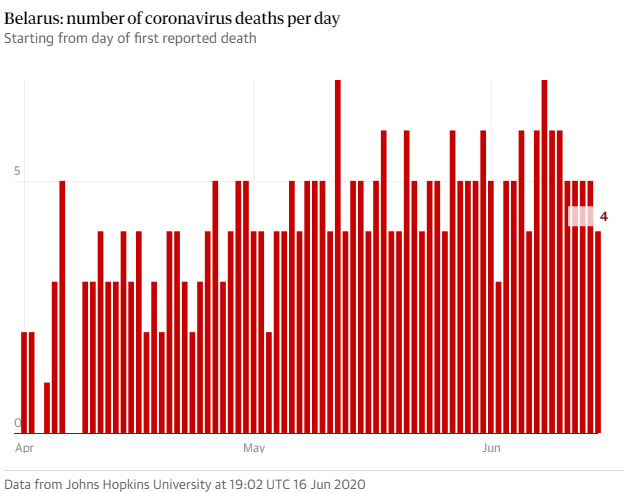
Lukashenko, sometimes described as “Europe’s last dictator”, has been president since 1994, winning re-election in curated campaigns that delivered 80% majorities. But on the verge of his sixth term as leader, he is in danger of facing a real election. Grassroots campaigns have collected hundreds of thousands of signatures to attempt to register three genuine opposition candidates.
In response, the government has launched a crackdown. One candidate has already been charged with public disorder and Babariko’s former bank was raided last week. Opponents say Lukashenko’s public approval has collapsed. “I can nearly guarantee you that Lukashenko has less than 50%,” Babariko said. “That’s what makes these elections unique.”
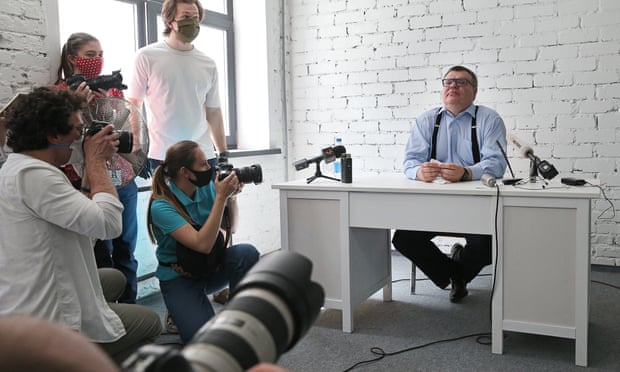
Viktor Babariko gives a press conference on the Belgazprombank raid. Photograph: Natalia Fedosenko/Tass
There are numerous factors for the discontent: a faltering economy, the bungled response to coronavirus, the growing reach of criticism through social media, an increasingly confident civil society – and exhaustion with a government that seems to have run out of ideas.
“It became an explosive cocktail,” said Valeriya Kostyugova, the editor of the Minsk-based Nashe Mnenie, noting that coronavirus had helped bring the crisis to a head. “The focus turned considerably to the elections and to hopes of somehow getting rid of Lukashenko and his government system.”
Among the usual run of puppet candidates who represent little threat to Lukashenko, real challengers have appeared. Establishment candidates such as Babariko and Valery Tsepkalo, a former ambassador to the US, indicate cracks in the elite. Sergei Tikhanovsky, a popular YouTuber with more than 235,000 subscribers, attracted thousands of Belarusians to events to collect signatures for his campaign under an anti-corruption slogan of “stop the cockroach”.
Many supporters brought slippers, the preferred weapon to kill household pests, at Tikhanovsky’s suggestion. Some media have dubbed it the “slipper revolution”.
Opinion polling is severely limited by the government but thousands have stood in mile-long queues to endorse the candidates, a political spectacle that observers say is unprecedented.
Activists wearing protective masks and gloves gather signatures in support of election candidates in Minsk. Photograph: Tatyana Zenkovich/EPA
“Lukashenko has managed to frustrate and irritate a lot of social groups,” said Artyom Shraibman, a Minsk-based political analyst, noting that the groundswell of opposition had helped expose the “myth” of Lukashenko’s popularity. “It’s a street protest but it’s also this middle-class drift into politics where people who never were political are now joining.”
Perhaps unsurprisingly, Tikhanovsky, with an appeal to regional and working-class voters who may have previously supported Lukashenko, was arrested first. On Thursday, he was charged with violating public order and assaulting police at a rally to collect signatures in the city of Grodno, and may face up to three years in prison. Observers say he will likely be held until after the 9 August elections.
“When he called and said he was going to run … I remember I replied ‘Sergei, you know how the presidential elections are going to end? In prison,’” said Alexander Kabanov, a blogger and activist who also serves as press secretary for the campaign.
“Tikhanovsky is a street politician […] and he never really hid that. That’s why they’ve gone for him first, because it’s the most dangerous thing for them, if people go out into the streets.”
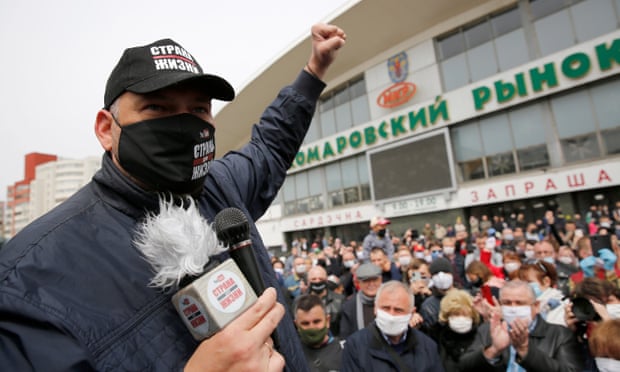
The YouTuber Sergei Tikhanovsky at a rally in Minsk. Photograph: Tatyana Zenkovich/EPA
Tikhanovskay’s wife, Svetlana, has collected enough signatures to run in his place and in a tearful video released on Tuesday told supporters she was pressing on despite receiving anonymous threats to take away her children unless she stood down.
Lukashenko appears to be considering a larger crackdown. On the same day as Tikhanovskay’s arrest, investigators raided Babariko’s former bank, Belgazprombank, as well as several other connected businesses.
“It’s touched clients. It’s touched my friends,” said Babariko. “This is a broad political persecution.”
On Friday, MolaMola, a popular crowdfunding platform co-founded by Babariko’s son, had its operations blocked. The platform had been instrumental in helping raise money for doctors and anti-coronavirus efforts, and the move against it appeared to target a crucial platform for civil activism.
Lukashenko has declared Belarus will not have a revolution and said that the upstart campaigns were being funded by Russian oligarchs, in what seemed a veiled reference to Babariko’s former employer. Belgazprombank is the local arm of Russia’s Gazprombank.
“I see everything. The main things is not to worry,” Lukashenko told his elections chief in a meeting last week. “There will be no coup in this country. Nor will there be a Maidan,” he added, referring to the 2014 revolution in Ukraine.
Analysts said Lukashenko’s attempts to normalise relations with the west, particularly during a period of tensions with Russia, which is putting pressure on Minsk to integrate the two countries in a “unified state”, could temper a potential crackdown, but that his desire for political survival would always come first.
Babariko has cautiously avoided calls to protest but says they may break out “if the people feel deceived”, recalling the experiences of Czechoslovakia and Romania.
“I don’t want to and will not initiate [protests], but if the people decide that’s what is needed, I will be with the people,” he said. “I prefer the idea of a velvet revolution, a revolution of hope … a peaceful, perhaps difficult, but legal handover of power.”
